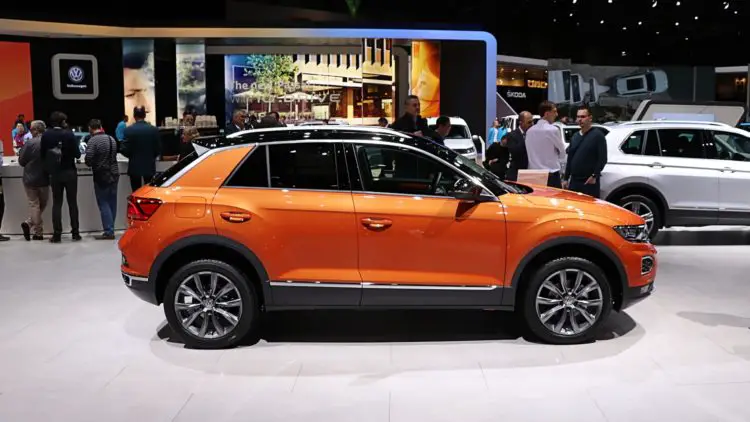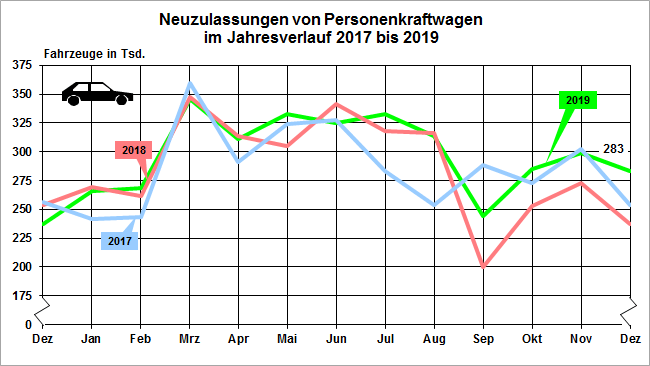In 2019, new passenger vehicle registrations in Germany increased by 5% to 3,607,258 cars – the biggest German car market this decade.

In full-year 2019, the German new car market expanded by 5% to 3,607,258 passenger cars (PKW) – the highest total of new passenger vehicle registrations in Germany in a calendar year since 2009. Sales of motorcycles, commercial trucks, and heavy vehicles also increased. SUVs were both the fastest growing and largest segment of the German new car market in 2019. Sales of electric cars increased by 76% to take a 1.8% share of the market. Average CO2-Emissions per car in Germany increased in 2019 to a high 157,0 g/km. Volkswagen was the best-selling car brand in Germany, the VW Golf the top-selling car model, and the Renault Zoe Germany’s favorite electric car model in 2019.
German Car Sales Statistics — 2022: Market Overview, Brands, Models, Electric; 2021: Market, Brands, Models, Electric; 2020: Market, Brands, Models, Electric; 2019: Market, Brands, Models, Electric
German New Motorized Vehicle Market in 2019 (Full Year)
In 2019, total new motorized vehicle registrations in Germany increased by 5.2% to 4,232,785 vehicles (Kraftfahrzeuge). Passenger cars (PKW) are by far the largest component of this total.
Buses were the only motorized vehicle class with significantly lower registrations in Germany in 2019. The continued increases in sales of commercial vehicles hint at underlying strength in the German economy that at times seemed to weaken in 2019 due to international trade regulatory uncertainty.
According to the KBA, the composition of the new motorized vehicle market in Germany in 2019 was as follows:
| Category | FY2019 | FY2018 | % Change 18/19 |
| Motor Cycles | 168,307 | 158,258 | +6.3 |
| Cars (PKW) | 3,607,258 | 3,435,778 | +5.0 |
| Buses | 6,437 | 6,687 | -3.7 |
| Trucks (Lorries / LKW) | 343,708 | 321,966 | +6.8 |
| Tractor Units (Zugmaschinen) | 86,039 | 82,923 | +3.8 |
| – of which Semi-Trailer (Sattelzugmachine) | 38,620 | 38,727 | -0.3 |
| Other motorized vehicles | 21,036 | 18,902 | +11.3 |
| All Motorized Vehicles (Kraftfahrzeuge zusammen) | 4,232,785 | 4,024,514 | +5.2 |
| Trailers | 317,945 | 307,085 | +3.5 |
| Source: KBA |
Car production in Germany in 2019 contracted by 9% to 4,661,800 cars according to the VDA. Car exports from Germany were down an even sharper 13% to 3,480,500 cars in 2019.
New Passenger Car Sales in Germany by Month in 2019
The German new passenger car market was mostly positive throughout 2019 but only clearly pulled ahead during the last four months of the year. This was largely due to particularly low passenger vehicle registrations during the final four months of 2018 when a change in emission regulations temporarily left many manufacturers unable to register cars.
New passenger vehicle registrations in Germany per month were as follows during the past three years:

New Car Sales in Germany by Year (2007-2019)
New passenger vehicle registrations in Germany in full calendar year 2019 increased by 5% to 3,607,258 cars. This was the highest total for the German new car market since 2009 when special tax breaks were temporarily introduced to boos the market (and led to an equally big contraction in 2010).
2019 was the sixth consecutive year that the German new car market exceeded 3 million vehicles. The 5% growth was also the biggest annual increase since 2015 although much of it was due to the weakness in the market during the final four months of 2018.
New passenger vehicle registrations in Germany by year since 2007 were as follows:
| Year | German Car Sales | % Change |
| 2019 | 3,607,258 | 5 |
| 2018 | 3,435,778 | -0.2 |
| 2017 | 3,441,262 | 2.7 |
| 2016 | 3,351,607 | 4.5 |
| 2015 | 3,206,042 | 5.6 |
| 2014 | 3,036,773 | 2.9 |
| 2013 | 2,952,431 | -4.2 |
| 2012 | 3,082,504 | -2.2 |
| 2011 | 3,173,634 | 9 |
| 2010 | 2,916,260 | -23.4 |
| 2009 | 3,807,175 | 23.2 |
| 2008 | 3,090,040 | -1.8 |
| 2007 | 3,148,163 | -9.2 |
| Source: KBA |
German Passenger Car Market in 2019 (Full Year)
During 2019, the popularity of both petrol and diesel-engined cars declined in Germany. Petrol remained by far the largest component of new cars (59.2% vs 62.4% in 2018) followed by diesel (32% vs 32.3%).
Hybrid cars took a market share of 6.6% with 238,250 (+84%) hybrid cars registered for the first time in Germany in 2019. This number includes 45,348 (+44%) plug-in hybrids.
Registrations of battery-electric cars increased by 76% to 63.281 electric cars for a market share of 1.8%. A significant increase is predicted once Volkswagen’s ID.3 start to reach the market in mid-2020. (Volkswagen sold its 250,000th electric car worldwide (since 2013) in December 2019 and forecasted to reach a million by 2023.) BMW predicted a third of all BMWs sold in Europe in 2021 will be electrified.
The most popular car colors in Germany in 2019 remained grey (including silver) at 30.3%, black (24.8%) and white (20.6%).
In 2019, the majority of cars was registered by businesses (65,5 percent / +8,1 %) and just over a third (34,5 percent / -0,4 %) privately.
The most important market sectors for German new car sales in 2019 were:
- 21.1% SUV, e.g. VW T-Roc
- 20.5% compact, e.g. VW Golf
- 13.5% small, e.g. VW Polo
SUVs sales grew by 21% in 2019, as the fastest growing market segment in Germany. Geländewagen (cross-country vehicles e.g. VW Tiguan) sales increased by 20.3% which meant around a third of all new car sales in Germany in 2019 was what is in many other countries simply termed SUVs.
Although the increase in average CO2-Emissions per car in Germany in 2019 to a high 157,0 g/km was largely blamed on a change in the WLTP rules, the sharp increase in SUV and Geländewagen sales certainly did not help (nor boosted the environmental credentials of German car buyers.)
Volkswagen was again the top-selling brand in Germany in 2019 and the VW Golf the favorite car model.
